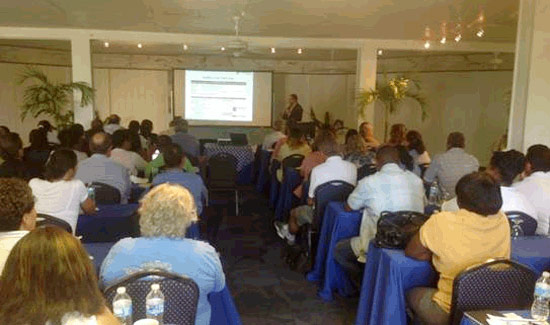Important information regarding the Land Ajudication Bill was shared with residents during a town meeting on Thursday night at the Eight Mile Rock High School gymnasium.
Minister of Lands and Local Government Byran Woodside explained that the purpose of the Bill is to give legal title to persons in possession of generation land.
The government seeks to hear from residents across the country, he said, and will consider their concerns in the final presentation of the Bill.
“Land remains a major issue for many Bahamians… In a lot of instances, you end up having more than one owner claiming the same land and people fighting each other for land,” Woodside said.
“There is a high proportion of land disputes… It is time that we modernize our laws in relation to land.”
He shared with the attendees the definition of generation land – a form of common property where several claimants hold undivided interest in the property. They derive their interest from claims of inheritance from a single ancestor, without following the legally prescribed procedures for administering the estates of deceased ancestors.
An important part of the Land Adjudication Bill, and what sets it apart from the Quieting Titles Act is that claimants would have to show an ancestral lineage or connection to the land.
If the matter of generation land is not cleared up, it will continue to be a lingering problem for many residents, Woodside said.
“The generation land properties will remain in the possession of families, but you will not be able to do anything with it unless you can get to this point where we have legislation that will grant you a marketable title at the end of the day and that’s what we’re seeking to do, to put a process that is fair and equitable that people can embrace.”
“We don’t have to do anything at all, but the next generation will be faced with this same problem because it won’t go away. This Bill, as is, gives you a course of action. What I like about this Bill is it’s affordable for poor people to claim some generation land and to be able to do something with it.”
During the question and answer segment of the meeting, several residents questioned the proposed limitation to the claiming of property which currently stands at one and a quarter acres.
Attorney Brandace Duncanson ex-plained that that limitation was created to provide a fair division of land in instances where there is more than one possible claimant. That statute is not set in stone, however, and could possibly be removed once the Bill becomes law.
“We wanted to prevent a situation where one family member who can show ancestral lineage from acquiring the entire tract. We didn’t want to create a situation where one cousin puts in a claim and basically ousts all the other family members,” she said.
“The Bill is still in its draft form and that limitation might be amended, giving the adjudication officer discretion on a case by case basis, but in terms of the limitation, that is the essence of it, to ensure that where there are 60 acres, and there might be 50 cousins or 60 cousins, we want to ensure that as many family members can benefit from the land as possible.”
Another issue that was raised was whether persons would have to travel from Family Islands to New providence as their application is being processed.
This concern was put to rest by Duncanson who explained that the adjudication officer will travel to the island where there is a claim to make his determination.
“He will sit in that island and hear the claims and make his determinations in that island so that will help to defray costs of having to travel to New Providence.”
Yet another issue was the disparity in fees that could be charged by the adjudication officer, but Woodside assured that the maximum that the fee can amount to is $500.
By K. NANCOO-RUSSELL
Freeport News Reporter



